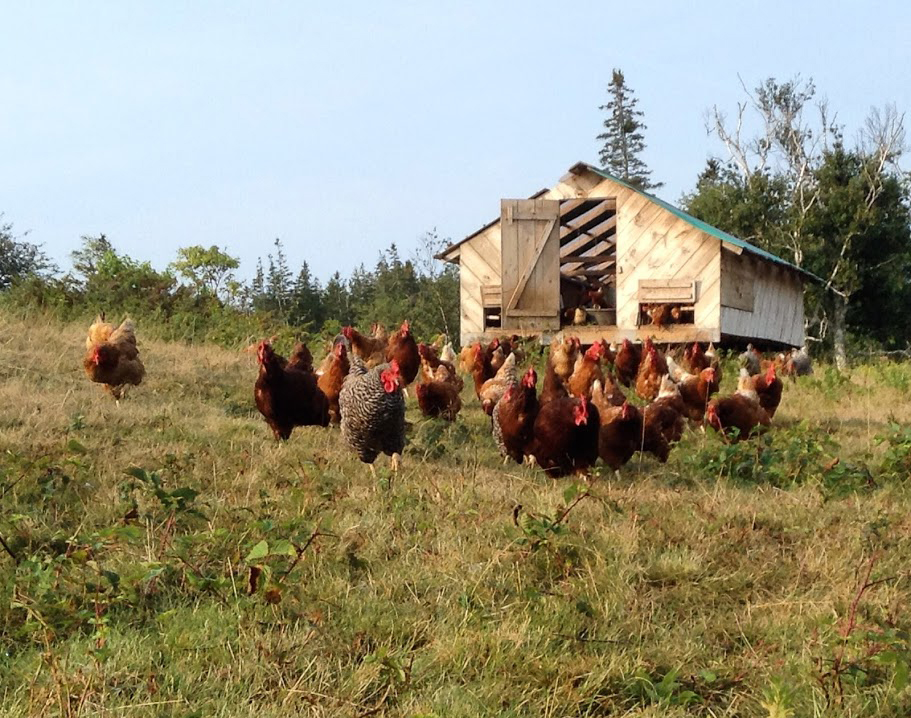The Island Institute’s Economic Development staff welcome you to this series of blog posts, a resource for island and coastal small businesses. To easily find future posts, go to the blog home page and select “economic development” from the drop down menu to filter blog posts by this topic, or go to islandinstitute.org/blog/economic.
What We Do
In addition to its business support and community economic development work, the Island Institute’s Economic Development program supports island and remote coastal farms and food businesses by sharing their stories and bringing attention to existing resources. In May 2015, we hosted island farmers and gardeners to discuss issues unique to island growing. The Community Development program also offers leadership training, including ISLE, to support these businesses. Will Tierney, featured below, was an ISLE graduate. If you are looking to find business efficiencies, please contact Stephenie.
SPOTLIGHT: Island Farmers use Networks for a Successful Start
January marked the 75th year of the State of Maine Agricultural Trades Show. Sessions included leasing land for farming, marketing with an online presence, business management, and energy efficiency and resources. Farmers and producers use events like these to learn about specific topics, and also to reach networks beyond their remote locations.
Networking helps link people in remote areas of Maine to one another and beyond. It’s common for farmers or producers to connect through a state association related to their individual work. For Erin Creelman, owner of Creelman Farm on Vinalhaven, the Maine Cheese Guild provides invaluable learning experiences by coordinating workshops at others’ farms and facilities throughout the state. “In most states,” she says, “the cheese guild provides marketing services, like a chamber of commerce, but Maine’s also focuses on education.”

Erin Creelman feeding kids
To inform his permaculture and hydroculture operations, Will Tierney, owner of Nimby Farms and Island Aquaponics on Long Island, follows Facebook groups to see what others are trying and doing. He also joined the Resilience Hub, a permaculture group based in Portland. Some of their meetings and educational opportunities are coordinated by the Maine Organic Farmers and Growers Association.
Sara Hodges also used Facebook to learn how other farms operate. She and John Wright own Sparkplug Farm on Vinalhaven, which sells milk, eggs, and produce. Hodges has attended the Agricultural Trades Show in the past, finding it very helpful. “We alternate the years that we go to conferences. The New England Vegetable and Berry Growers is held in New Hampshire and the Farmer-to-Farmer Conference is held in Northport,” said Hodges. “These cover both conventional and organic growing, so we can see what trends are emerging.”
A repeated piece of advice was to start small. “Don’t try to do lots of products,” said Creelman. “Stick to three products you can do really well.” Tierney said, “Starting small means you’ll only fail small; you can experiment and grow from there.”
Connecting with community members early is important for success. “Neighbors being in the dark means they will assume the worst and get panicked,” said Tierney. Being a hard worker is a New England value that Hodges took to heart after moving to Vinalhaven. “People get to know you as someone committed to working hard within the community,” she said.
Insurance became a priority “when we got animals, and needed a raw milk license, when we started selling at the market,” said Hodges, who has an umbrella insurance policy for the farm. The regional University of Maine Cooperative Extension office was very helpful to her in exploring what was needed and all the options.
Since most regulations often don’t apply to small-scale operations, it is not possible to show compliance to insurance companies. Creelman used her network to find a solution: “The Maine Cheese Guild provided a resource that synthesized the regulations and showed which ones applied to a small-scale producer, and that could be provided to the insurance company.”
Like other businesses in the start-up phase, these farmers and producers have personally financed initial investments. While businesses are increasingly using crowdfunding for start-up costs, farms often set up community-supported agriculture shares, where a share in the season’s production is purchased in the spring. “The CSA is like our spring loan,” said Hodges.
RESOURCES:
Make sure the information about your business is correct on these websites:
- The Get Real, Get Maine is the state’s official searchable database of farms and food producers.
- The Maine Food Atlas is used to explore and document regional food systems.
- The Maine Federation of Farmers’ Markets is searched by consumers to find a farmers’ market near them.
Financing, grants, and insurance resources:
- Maine Program for crop insurance and risk management assistance
- Grants and loans from the USDA for energy systems or efficiency projects
- Cooperative Extension for agricultural programs and resources
- Loans and other resources from the Maine Office of the USDA
- Agricultural loans from Coastal Enterprises, Inc.


